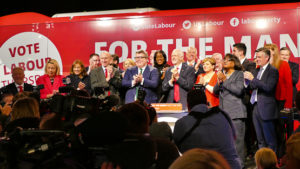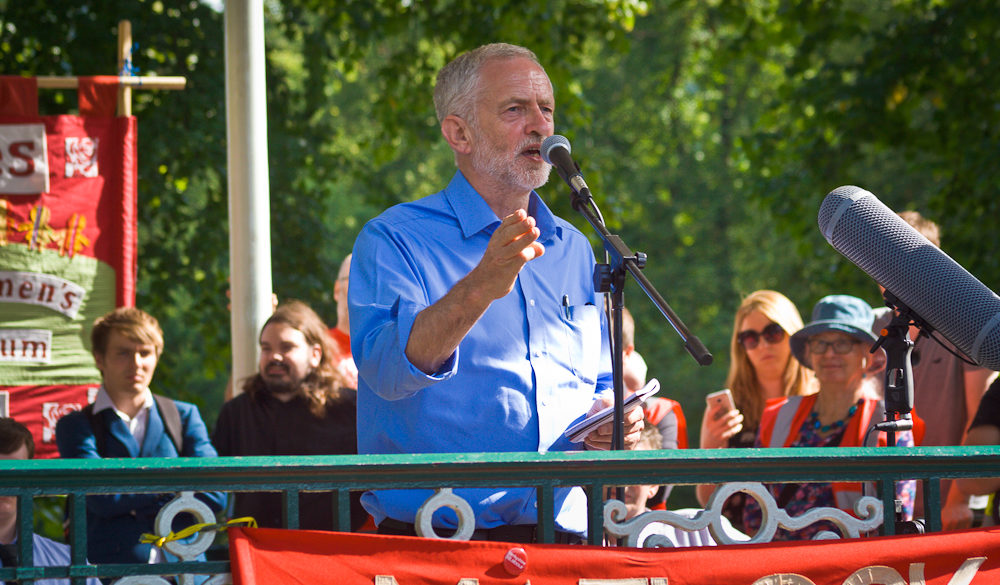The Labour left has decided that its route to success rests on a high-stakes gamble: re-imagine Jeremy Corbyn as a populist champion of the people, or risk the fracturing of the party, disillusionment of the membership and ultimately the loss of their electoral gains. But their bold plans are at odds with their quiet timidity.
A study commissioned by the Fabian Society in the dying breaths of 2017 appeared to point to a vast pool of potential voters for Jeremy Corbyn’s Labour party. The poll, conducted by YouGov, shows that while 41% of voters share Labour’s ‘values’, only 31% would actually back them in an election. For the Fabians, this poll demonstrated Labour’s ability to win an election outright.
Two overlapping points come to mind when considering this poll. First, Corbyn himself may be the cause of a reluctance to vote Labour. However, a second reaction we might have to this poll is to question what actually constitutes the sharing of values with a party that has supposedly undergone such rapid change over the course of the last 2 years.
With the party in such flux, it seems to be nigh on impossible to begin to pin down what their values actually are. Can anyone with certainty state where the party stands, for example, on nuclear disarmament? What about their position on Brexit? Even their stance on immigration is befuddled and disparate with competing figures within the party putting forward a myriad of different positions. The average voter may be left somewhat confused when party MPs themselves seem unclear on these answers.
It is unclear whether Labour currently have a concrete set of values that can be agreed with, and equally unclear whether, even if they do, they are discoverable at present. It is a miracle that the party remains in one piece, let alone that the voting public can identify their values, and that three-quarters of those that do are then willing to vote for the party.
Polls such as these should thus be viewed with a great deal of caution. This is particularly so when the party is keen to show its range of appeal. It no longer appears to chase after a traditional working-class demographic, nor is it content to go after the fabled ‘middle-England’ that was the consensual target of both New Labour and the Conservatives. Now the party is supposedly ‘for the many and not the few’. It follows that they stand for many, perhaps often competing, values.
Labour is of course a broad church. This breadth was in large part what made the sedimentation of Corbyn as leader such a difficult process – would he, as a left-wing backbencher, be able to maintain the support of a disparate array of MPs, party members and the voting public? What, under Corbyn, would the party be against? And more importantly, what would it stand for?
Labour strategists openly discussed their plans to counter these issues. That strategy was to reinvent Corbyn as a populist. Strategically one can see the merits of this manoeuvre when we consider what an appeal to populism consists of.

Populism is above all a simplifying mechanism. What is a populist for? The people. What does a populist stand against? The establishment.
At a time when the seams that tie together the patchwork quilt of opinions and factions within the Labour party seems to be bursting apart, a populist discourse acts as a force that simultaneously unites and divides with equal vigour – you either stand with the people or with the elite.
A new political frontier is drawn and a side must be chosen. This is how Labour remains buoyant even when the public are unsure of their values. Whatever they may be, they are not the Conservatives. This will always provide a minimum ‘core’ of voters, but populism amplifies this guiding political logic beyond party boundaries and voting ‘traditions’.
This strategy appeared to have been working. Corbyn managed to guide his party through turbulent and dislocating internal conflict. He even managed to put the entire field of public polling into disrepute (an occurrence of increasing regularity) by gaining 30 MPs in the 2017 snap election, leaving Theresa May’s Conservative party hanging on by a thread made up of expensive DUP MPs. By endorsing the populist distinction between the people and an establishment, Corbyn could narrow the gap between those that share Labour’s values and an actual vote for the party – you are either with the party’s values or are against them.

But now that the season of political campaigning has ended, what does Corbyn do between now and whenever the next election might occur? It is one thing to become the firebrand of a political rally during an election campaign, but it is another thing entirely to maintain this mode of operating during the ‘normal’ times. Election-mode Corbyn may in many ways be a populist, and this populism may have been the key to his success. But his populist credentials are much harder to gauge for the duration of the political cycle.
Populists usually counter these mundane periods by maintaining and cultivating antagonistic oppositions, seen acutely between parties at election time, for all the year around. In fact, keeping up a high level of antagonistic rhetoric is vital in maintaining the division (and thus the identity) of the people and their rivals in the establishment.
Yet for all the claims that Corbyn is a populist, including those by his own party, he clearly fails this last test. Corbyn’s non-confrontational style of politics was precisely one of the features that helped set him apart from rival candidates in his initial party leadership election campaign.
Certainly, Corbyn makes a great number of appeals to the people in his speeches and social media posts. Yet this hardly seems to differentiate him from any politician who seeks to appeal to as wide a proportion of the electorate as possible. What does however differentiate Corbyn from traditional party rhetoric is his repeated references to an ‘establishment’ – one that seeks to “vilify” those that challenge them. This would appear to put Corbyn much more firmly in populist territory.
Being seen to make reference to an establishment is not as easy as it first sounds. After all, during the Brexit debates Labour were seen as being on the side of this same establishment.
This is why antagonism is so valuable to the prospective populist. By making clear that there are two diametrically opposed blocs in society, the people and the establishment, then a political party can more easily position itself in the new political terrain by aligning itself with the people through clear and confrontational attacks on the establishment.
So whilst Corbyn and his party can speak of the people and the establishment, their own position in this new landscape will be left obscured without some dose of conflictual and antagonistic boundaries being drawn.
Labour’s slogan is indicative of this ambiguity and lacklustre approach. It is one thing to be a party that is ‘for the many, not the few’. But it is another thing entirely to try and align the party itself with the many, define the few to which they are opposed, and then convince the many that the best way to oppose these few is with support, and more importantly votes, for the party.

This gap in Labour’s populist rebranding of Corbyn is made all the more acute by the adoption of the populist slogans bandied about during the Brexit referendum by the Conservative party. Their current political remit is based upon ‘taking back control’ in accordance with the ‘will of the people’. Those that oppose the Conservatives thus must be enemies of the state, according to certain right-wing newspapers, with the Labour party and Corbyn personally becoming responsible for any blockages in the Conservative’s attempts to deliver for the people. The ‘establishment’ here is clearly represented by Labour, the EU and the ‘metropolitan liberal elite’ that reside in Remain supporting city-centres.
If Labour is truly set on engaging in populist strategies in order to combat this stance then they must themselves ‘take back control’ of the current populist discourse that is penetrating British politics. Otherwise they will certainly not win on the populist front and must devise another way with which to oppose the current government. This path requires a much more antagonistic stance against the Conservatives and a clearer picture of who the ‘establishment’ is that they purport to oppose.
The populist route could allow for the continuing existence of Labour’s broad church by defining their values within a populist framework. There may be differences in values from one party member to the next, or one MP to another, but they remain united in that this entire set of values exist in opposition to those of an establishment that is not reducible to, but is represented by, the Conservative party.
This is not an endorsement of populism so much as it is a statement of the obvious: if you have a strategy, you must commit to it or be doomed to failure. The populist gamble should thus be clear. Either Corbyn must drop the populist strategy that his opponents are dominating and return to classic party politics – a move that would see Labour pick out particular segments of voters according to class or age whose interests they claim to represent over and above their competitors. Or he must fully engage with what it means to adopt a populist discourse and make clear what the divisions are between those he calls the people and those he claims are part of the establishment.
Only then will the claim that Labour stands ‘for the many and not the few’ translate from empty sloganeering into a radical call that binds Labour to the many. The Labour strategists have wagered on this move. Now they must go all in.
Further Reading:
Andrew Harrop, 2018. Labour is winning the battle of values: http://www.fabians.org.uk/labour-is-winning-the-battle-of-values/
Joe Watts, 2017. Jeremy Corbyn muddies water over Labour immigration policy after appearing to back EU free movement: http://www.independent.co.uk/news/uk/politics/jeremy-corbyn-confusion-labour-immigration-policy-eu-free-movement-wedded-deputy-leader-tom-watson-a7519231.html
Heather Stewart and Jessica Elgot, 2016. Labour plans Jeremy Corbyn relaunch to ride anti-establishment wave: https://www.theguardian.com/politics/2016/dec/15/labour-plans-jeremy-corbyn-relaunch-as-a-leftwing-populist
Tom McTague and Charlie Cooper, 2017. Jeremy Corbyn’s plan to copy Trump’s playbook: https://www.politico.eu/article/revealed-jeremy-corbyn-labour-plan-to-copy-donald-trump-playbook/
Ian Silvera, 2017. Jeremy Corbyn: I’m being vilified for fighting the British establishment: http://www.ibtimes.co.uk/jeremy-corbyn-im-being-vilified-fighting-british-establishment-1617840





